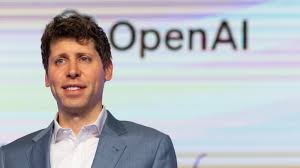
Humanoid Robots May Soon Replace Jobs, Warns OpenAI CEO Sam Altman

 :
| Updated On: 17-Jun-2025 @ 3:06 pm
:
| Updated On: 17-Jun-2025 @ 3:06 pmSHARE
OpenAI CEO Sam Altman, in a recent interview with Bloomberg Originals' The Circuit with Emily Chang, shared his views on the profound impact artificial intelligence (AI) is poised to have on employment, technology, and global infrastructure. Altman emphasized that AI will inevitably lead to major job changes—eliminating some but creating many new roles, a pattern consistent with past technological shifts. However, what differentiates the current moment is the unprecedented speed of these changes.
Altman also highlighted the imminent arrival of humanoid robots as a significant development. He believes that while the world hasn’t yet experienced a major shift due to humanoid robots, their widespread use—and the resulting labor replacement—is not far off. Additionally, he pointed to AI's potential in accelerating scientific discovery, predicting that 2025 will see AI agents handle routine tasks, while 2026 could mark breakthroughs in new science and innovation.
A major focus of the conversation was the Stargate Project, an ambitious $500 billion AI infrastructure initiative led by OpenAI, Microsoft, Nvidia, Arm, Oracle, Softbank, and others. Announced by US President Donald Trump earlier this year, Stargate is described as one of the most significant infrastructure efforts since the Apollo Moon missions. The goal is to construct massive AI-supportive infrastructure across the United States over the next four years, including data centers, energy plants, and power networks.
The first data center, currently being built in Texas, will be dedicated to training OpenAI’s next-generation AI models. Altman shared that “Stargate” was originally an internal codename inspired by early data center layouts. He explained that OpenAI had underestimated how extensively people would use AI models, which led to overwhelming demand and compute shortages. The recent popularity of AI-generated Studio Ghibli-style images significantly increased inference demands, forcing OpenAI to divert computing resources from other features and research.
Regarding compute limitations, Altman acknowledged Microsoft’s substantial support but said that the scale of demand surpasses what any one company, including Microsoft, can deliver alone. He stressed the need for more GPUs to better handle surges in usage without disrupting other services.
The interview also touched on competition. When asked about DeepSeek's cost-efficient large language models (LLMs), Altman acknowledged their talent but downplayed any notion that they had developed a drastically more efficient solution than OpenAI. He reiterated that OpenAI continues to improve with better chips, algorithms, and energy sources.
On the financial viability of OpenAI, Altman was candid, stating that although OpenAI is doing something unprecedented, success is not guaranteed. He noted the company’s dependency on continued user engagement and payments, warning that OpenAI’s financial position could become vulnerable if that support wanes.
Altman concluded by expressing optimism about Donald Trump’s possible re-election and its implications for the AI sector. He said Trump could make some of the most consequential decisions related to AI and praised his ability to grasp the industry's rapid evolution. Overall, the interview presented Altman’s multifaceted vision of an AI-driven future, along with the opportunities, challenges, and infrastructure needed to support it.
Contact Us
House. No. : 163, Second Floor Haridev Rd, near Puberun Path, Hatigaon,Guwahati, Assam 781038.
E-mail : assaminkcontact@gmail.com
Contact : +91 8811887662
Enquiry
×
Reporter Login
×